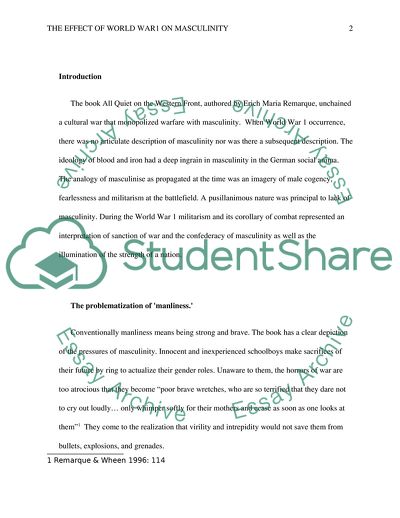Cite this document
(The Effect of World War1 on Masculinity in All Quiet on the Western Front Book Report/Review Example | Topics and Well Written Essays - 2250 words, n.d.)
The Effect of World War1 on Masculinity in All Quiet on the Western Front Book Report/Review Example | Topics and Well Written Essays - 2250 words. https://studentshare.org/gender-sexual-studies/1872966-discuss-the-effect-world-war1-had-on-masculinity-as-represented-in-all-quiet-on-the-western-front-by-erich-maria-remarque
The Effect of World War1 on Masculinity in All Quiet on the Western Front Book Report/Review Example | Topics and Well Written Essays - 2250 words. https://studentshare.org/gender-sexual-studies/1872966-discuss-the-effect-world-war1-had-on-masculinity-as-represented-in-all-quiet-on-the-western-front-by-erich-maria-remarque
(The Effect of World War1 on Masculinity in All Quiet on the Western Front Book Report/Review Example | Topics and Well Written Essays - 2250 Words)
The Effect of World War1 on Masculinity in All Quiet on the Western Front Book Report/Review Example | Topics and Well Written Essays - 2250 Words. https://studentshare.org/gender-sexual-studies/1872966-discuss-the-effect-world-war1-had-on-masculinity-as-represented-in-all-quiet-on-the-western-front-by-erich-maria-remarque.
The Effect of World War1 on Masculinity in All Quiet on the Western Front Book Report/Review Example | Topics and Well Written Essays - 2250 Words. https://studentshare.org/gender-sexual-studies/1872966-discuss-the-effect-world-war1-had-on-masculinity-as-represented-in-all-quiet-on-the-western-front-by-erich-maria-remarque.
“The Effect of World War1 on Masculinity in All Quiet on the Western Front Book Report/Review Example | Topics and Well Written Essays - 2250 Words”. https://studentshare.org/gender-sexual-studies/1872966-discuss-the-effect-world-war1-had-on-masculinity-as-represented-in-all-quiet-on-the-western-front-by-erich-maria-remarque.


